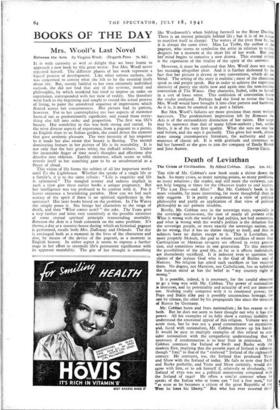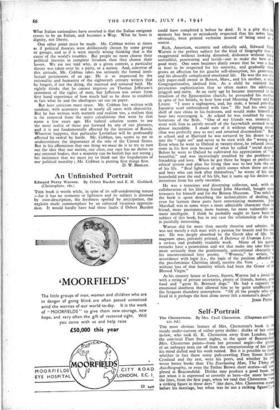Death of Leviathan
The Crisis of Civilization. By Alfred Cobban. (Cape. x2s. 6d.) .
THE title of Mr. Cobban's new book sends a shiver down the back. So many crises, so many turning-points, so many problem; so many solutions ; the reader, and still more the reviewer, can- not help longing at times for the Observer leader to end leaders, "The Last Day—and After." But Mr. Cobban's book is far more valuable, far more interesting, far more thoughtful than its title suggests. It is partly a statement of a view of political philosophy and partly an application of that view of political philosophy to our present troubles.
Briefly, Mr. Cobban sees in the sovereign state, especially in the sovereign nation-state, the root of nearly all present
What is wrong with the world is bad politics, not bad economics, and what is wrong with the world's politics is the delusion that the sovereign people, or more exactly the sovereign nation, can do no wrong, that it has no duties except to itself, and that its subjects have no duties except to it. This is Leviathan, or more properly Moloch, the god to whom sacrifices of more than Carthaginian or Mexican savagery are offered in every genera- tion, and sometimes twice in one generation. To this monster the possibilities of the good life, as far as it affects individuals, are shamelessly sacrificed. It is indecent even to question the claims of the jealous God who is the God of Battles and of Nations. No religion has asked such sacrifices or has received them. No dogma, not Marxism, not Catholicism, has so subdued the human mind as has the belief in " my country right or wrong."
It is possible, indeed, it is necessary, for the candid observer to go a long way with Mr. Cobban. The power of nationalism is immense, and its potentiality and actuality of evil are immense too. Nothing really competes with it in emotional power; the Pope and Stalin alike pay it possibly unconscious homage, the one by silence, the other by his propaganda line since the invasion of Russia by Germany. Mr. Cobban hates and fears nationalism ; he has reason to do both. But he does not seem to have thought out why it has this power. All his examples of its folly show a curious inability to understand the emotional appeal of this religion. Voltaire was an acute man, but he was not a good commentator on mysticism, and, faced with nationalism, Mr. Cobban throws up his hands. It would be easy to multiply examples of this refusal to con- sider nationalism with the sympathetic understanding that is necessary if condemnation is to bear fruit in penitence. Mr. Cobban contrasts the Ireland of Swift and Burke with the
modern Eire, implying that the present state of Ireland is inferior, though " free," to that of the " enslaved " Ireland of the eighteenth
century. He contrasts, too, the Ireland that produced Yeats and Shaw with the Ireland of today. He fails to note that Swift and Burke probably, and Yeats and Shaw certainly, would dis-
agree with hint, or to ask himself if, relatively or absolutely, the
Ireland of 1750 was not a political monstrosity compared with the Ireland of 1940? He offers a similar contrast when he speaks of the Italian who at home can " feel a free man," but " as soon as he becomes a citizen of the great Republic of the West he loses his liberty." But who has ever asserted this?
Wfiat Italian nationalists have asserted is that the Italian emigrant ceases to be an Italian, and becomes a Wop. What he loses is dignity, not liberty.
One other point must be made. Mr. Cobban writes at times as if political theories were deliberately chosen by some group or groups, and as if it were merely wrong thinking that is the cause of the world's troubles. But people no more choose their political theories in complete freedom than they choose their lovers. We are not told why, in a given context, a particular theory was taken• over by a party, or a nation. And, converse of this attitude, Mr. Cobban takes too seriously the formal intel- lectual pretensions of an age. He is so impressed by the rationality and humanity of the eighteenth century writers that he forgets, if not the dying, the maimed and tortured bird. He rightly thinks that he cannot improve on Thomas Jefferson's statement of the rights of man, but Jefferson was aware from first hand experience of how much had to be done to establish in fact what he and the ideologues set out on paper.
But here criticism must cease. Mr. Cobban has written with candour, with acuteness and in nearly all cases with objectivity. But he has written with warmth and realism too, a realism that is far removed from the naive calculations that went by that name a few years ago. His federal solution seems to me the most realist of those put forward by any of our planners, and it is not fundamentally affected by the invasion of Russia. Whatever happens, that particular Leviathan will be profoundly affected by ordeal by battle. Mr. Cobban, too, seems to me to underestimate the importance of the role of the United States. But in his affirMation that one thing we must do is to try to root out the idea that our nation, our class, our race has no duties to any external bodies, that a majority can be foolish but not wrong ; his insistance that we must try to think out the foundations of our political morality ; Mr. Cobban is putting first things first.
D. W. BROGAN.


























 Previous page
Previous page